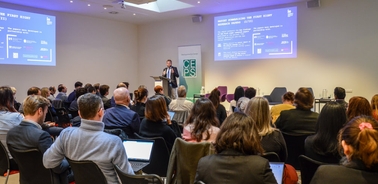- Home
- News And Events
- News
- Digital Disruption Requires A New Social Contract To Safeguard Societies, Ie University Report Reveals
Digital Disruption Requires a New Social Contract to Safeguard Societies, IE University Report Reveals

According to “The Digital Economy and the New Social Contract” report, constructing an inclusive digital economy will require collaboration between multiple stakeholders as well as bridging the gap with the private sector.
New research from IE University’s Center for the Governance of Change (CGC) highlights the need for a new social contract to manage the economic and social transformations caused by the rise of disruptive technologies.
Trust in democracy and its institutions is dwindling and political concerns around tech platforms have increased. The conversation around technology should not only be technical but political too. The report argues this would allow civil society to become more integrated into the decision-making processes around the adoption of new technologies.
There must be active engagement between public and private stakeholders who have a key role in digital policy design and implementation. Collaboration, communication and engagement between these sectors should become the norm.
“Better policy making in the digital age requires organizational changes,” argues Miguel Otero, author of the report and research director at the Center for the Governance of Change.
“The public sector will have to navigate differences and the reluctance of institutions to cooperate in pursuit of the same goals.”
Miguel Otero, author of the report and research director at the Center for the Governance of Change
Meanwhile, the private sector must take responsibility for the use of technology and its consequences for the rest of society by renewing and integrating a social commitment into its business model.
Ultimately, the authors conclude, a digital economy that combines innovation and inclusion is possible. However, societies need to work to find the balance that brings everyone along according to their social particularities and contexts.
The report was presented at the Centre for European Policy studies (CEPS) in Brussels on November 18, 2022, with representatives from the European Commission, the private sector and academia. IE University Provost Manuel Muñiz, stressed: “A new social contract for the digital age should be based on legitimate institutions and on an economy that provides shared prosperity.”
THE PROJECT
This report is part of the research project “The Digital Revolution and the New Social Contract” by the Center for the Governance of Change. Upcoming research from this project will focus on data privacy, the geopolitical implications of the digital economy and, lastly, the articulation of a New Digital Social Contract.
THE CGC
The Center for the Governance of Change (CGC) is an applied-research, educational institution based at IE University that studies the political, economic, and societal implications of the current technological revolution and advances solutions to overcome its unwanted effects.
The CGC does so by producing pioneering impact-oriented research that cuts across disciplines and methodologies to unveil the complexity of emerging technologies such as Artificial Intelligence, Big Data, Blockchain, and Robotics, and explore its potential threats and contributions to society.
Moreover, the CGC also runs a number of executive programs on emerging tech for public institutions and companies interested in expanding their understanding of disruptive trends, and a series of outreach activities aimed at improving the general public’s awareness and agency over the coming changes. All this for one purpose: to help building a more prosperous and sustainable society for all.
IE UNIVERSITY
IE University is an international university based in Madrid and Segovia, Spain that offers programs in international relations, business administration, economics, law, technology, and social sciences. Recognized as a leading educational institution in Europe and around the world, IE delivers several master’s degrees featured in the worldwide top 10 according to the Financial Times, The Economist, Forbes, QS, and other well-established rankings. With over 7,000 students, 80% of them international, and an active network of 60,000 alumni distributed among 165 countries, IE is characterized by its diversity and openness to the world. The University is supported by 30 permanent international offices, which organize over 2,000 events every year.